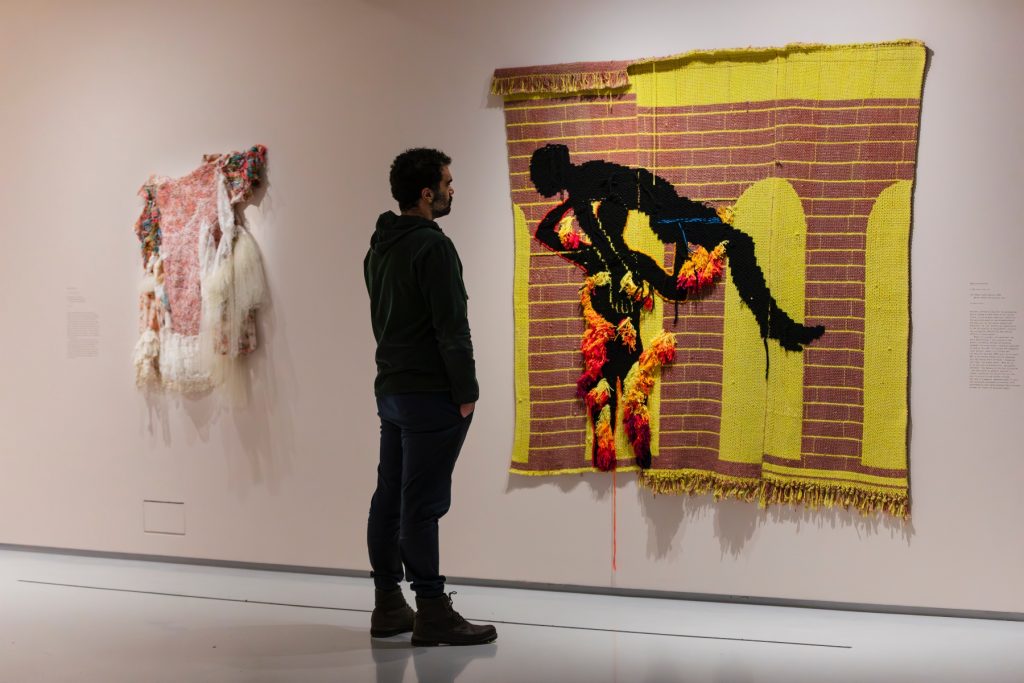The American weaver Diedrick Brackens and Lebanese artist Mounira al Solh have joined artists Yto Barrada and Cian Dayrit and two other lenders in requesting their work be removed from an exhibition at the Barbican in London in protest of an alleged censorship scandal. Last month, the arts center canceled a lecture by Indian writer Pankaj Mishra after it realized that he would be addressing Israel’s war on Gaza.
Two married collectors, Lorenzo Leviste and Fahad Mayet, initiated the protest at the end of February by requesting that two quilts by Gee’s Bend artist Loretta Pettway be removed from the exhibition “Unravel: The Power and Politics of Textiles in Art,” which opened in February 13. The quilts had been lent to Barbican by Leviste and Mayet for the exhibition. Now a total of five artists and eight artworks have been withdrawn.
Mounira Al Solh is the latest artist to request her work be withdrawn today. Last week, the Filipino artist Cian Dayrit and the French-Moroccan artist Yto Barrada also requested that their works be removed from the show.
“We cannot take seriously a public institution that does not hold a space for free thinking and debate,” said Barrada, “however challenging it might feel to some staff, board members, or anxious politicians.”
Diedrick Brackens, whose woven tapestries speak to the Black queer experience, also requested on Friday that his work fire makes some dragons (2020) be removed from the show. He said the censorship of Mishra had sullied the show’s “well-intentioned vision” and called for “Unravel” to be closed “in solidarity with those calling for immediate ceasefire.”

Diedrick Brackens, fire makes some dragons (2020) at “Unravel: The Power and Politics of Textiles in Art” at the Barbican Art Gallery. Photo: Jemima Yong, © Barbican Art Gallery.
“I am dismayed by the museum’s acts of censorship and refusal to hold itself accountable,” he said in a statement to the Barbican’s administration and trustees. “It is disheartening that this exhibition has to be dismantled work by work in order to expose the complicity of the institution in silencing those of us who are speaking out against the historical and ongoing violence being committed in Gaza.”
“The work in ‘Unravel’ has garnered the Barbican considerable attention and acclaim, and positions the institution in alignment with the often unsung work of women and people of color,” he added. “However, the institution, through its actions, has betrayed its lack of commitment to any such radical politics or the people who espouse them.”
The Barbican did not immediately respond for a request for comment about these latest withdrawals from “Unravel.”
The arts center decided not to host Mishra’s lecture, which was organized by the London Review of Books (LRB), after it learnt that the talk’s title was “The Shoah after Gaza.” Shortly after the news broke, the arts center released a statement claiming that it had been prematurely advertised as the venue for the lecture before this had been officially agreed with the LRB. This meant that the Barbican did not have time to give the topic “dedicated and thoughtful care.” The LRB denies this version of events, stating that the lecture had been canceled “at a late stage.”
“As lenders to the exhibition, which explicitly aligns itself with values of ‘resistance,’ ‘protest,’ ‘solidarity,’ and ‘liberation,’ we were disturbed and alarmed by the Barbican’s late-stage cancellation of the lecture,” Leviste and Mayet said in their online statement, when they chose to pull Pettway’s quilts. They also published their email correspondence with the show’s curators following the removal of the quilts.
Loretta Pettway’s quilts were removed from the “Unravel” exhibition at the Barbican in London in February 2024. Photo: Courtesy of Censorship at the Barbican.
The Barbican’s chief executive Claire Spencer told the Guardian last week that the institution recognized why the cancelation of Mishra’s lecture “has created significant concern about artistic freedom and distress about which voices are given a platform to speak during this moment of deep humanitarian crisis, and those which are not.”
“We respect the lenders’ decision,” the show’s curators wrote on a sign placed by the empty platform that once displayed Pettway’s textiles lent by Leviste and Mayet.
Last year the Barbican advised the Palestininan radio host Elias Anastas, who was participating remotely in an event organized by the arts center, to “avoid talking about free Palestine at length… just to further safeguard the audience.” His interviewer Nihal El Aasar was also advised to “steer clear of thorny issues,” according to the Guardian.
Follow Artnet News on Facebook:
Want to stay ahead of the art world? Subscribe to our newsletter to get the breaking news, eye-opening interviews, and incisive critical takes that drive the conversation forward.

